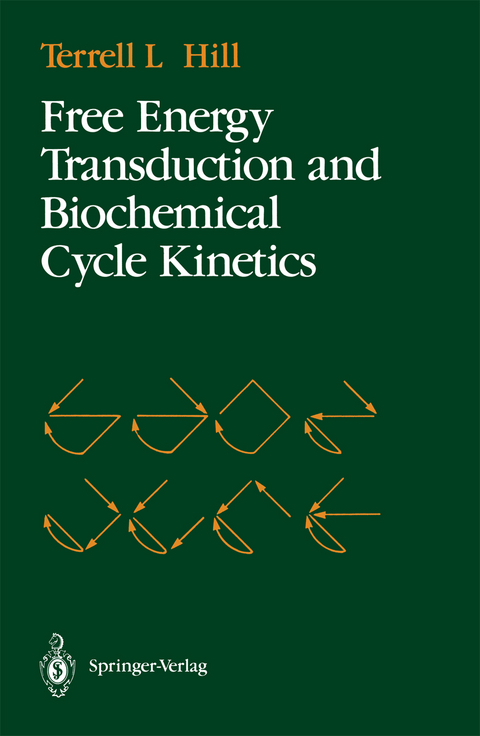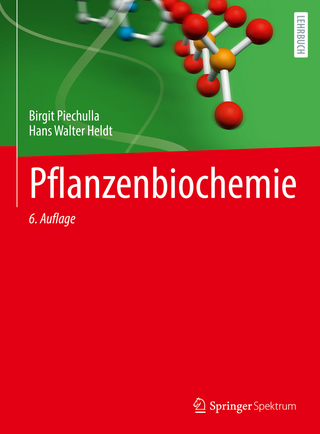
Free Energy Transduction and Biochemical Cycle Kinetics
Seiten
1988
Springer-Verlag New York Inc.
978-0-387-96836-0 (ISBN)
Springer-Verlag New York Inc.
978-0-387-96836-0 (ISBN)
Contents Preface . . . . . . . . . . . . . . . . . . . . . . . . . . . . . . . . . vii . . . . . . . . . . . . . . . . . . . . . . . . . . . . . . . . . . . . . . . . . . . . . . . . . . . . 12 . . . . . . . . Efficiency and the Rate of Free Energy Dissipation . . . . . . . . . . . . . . . . . . 24 . .
This small book is a simplified, abbreviated, and updated version of the author's Free Energy Transduction in Biology, published in 1977 (Academic Press, New York). The present book is meant to be a textbook for a class or for self-study. The first chapter gives a self-contained and elementary discussion of the principles of free energy transduction in biology. Section 5 includes new material on the Onsager coefficients Lij (for systems near equilibrium) not avail able in 1977. Some readers may wish to study the first chapter only. The second chapteris a little more sophisticated, and deals with the so-called diagram method for calculating steady-state probabili ties and cycle fluxes. Although these concepts are useful in the analysis of free energy transduction systems, they have an intrinsic importance and interest. Section 8 summarizes quite recent new results not included in the 1977 book. The third chapter is again a step more sophisticated. Some readers may wish to omit it. Free energy levels of the states in a kinetic diagram are introduced. This topic is primarily of conceptual inter est for ordinary kinetic diagrams but it is essential in understanding muscle contraction (and related systems) at the molecular level. Contents Preface . . . . . . . . . . . . . . . . . . . . . . . . . . . . . . . . . vii . . . . . . . . . . . . . . . . Chapter 1 Survey of the Elements of Free Energy Transduction. . . . . . . . . . . . . .. . . . . . . . . . 1 1. States, Diagrams, Cycles, and Free Energy Transduction ...................... 2 2. Thermodynamic Forces. . . . . . . . . . . . . . . . 12 . . . . 3. Operational, Cycle, and Transition Fluxes. . . . . 20 4. Efficiency and the Rate of Free Energy Dissipation . . . . . . . . . . . . . . . . . . 24 . . . . . .
This small book is a simplified, abbreviated, and updated version of the author's Free Energy Transduction in Biology, published in 1977 (Academic Press, New York). The present book is meant to be a textbook for a class or for self-study. The first chapter gives a self-contained and elementary discussion of the principles of free energy transduction in biology. Section 5 includes new material on the Onsager coefficients Lij (for systems near equilibrium) not avail able in 1977. Some readers may wish to study the first chapter only. The second chapteris a little more sophisticated, and deals with the so-called diagram method for calculating steady-state probabili ties and cycle fluxes. Although these concepts are useful in the analysis of free energy transduction systems, they have an intrinsic importance and interest. Section 8 summarizes quite recent new results not included in the 1977 book. The third chapter is again a step more sophisticated. Some readers may wish to omit it. Free energy levels of the states in a kinetic diagram are introduced. This topic is primarily of conceptual inter est for ordinary kinetic diagrams but it is essential in understanding muscle contraction (and related systems) at the molecular level. Contents Preface . . . . . . . . . . . . . . . . . . . . . . . . . . . . . . . . . vii . . . . . . . . . . . . . . . . Chapter 1 Survey of the Elements of Free Energy Transduction. . . . . . . . . . . . . .. . . . . . . . . . 1 1. States, Diagrams, Cycles, and Free Energy Transduction ...................... 2 2. Thermodynamic Forces. . . . . . . . . . . . . . . . 12 . . . . 3. Operational, Cycle, and Transition Fluxes. . . . . 20 4. Efficiency and the Rate of Free Energy Dissipation . . . . . . . . . . . . . . . . . . 24 . . . . . .
1 Survey of the Elements of Free Energy Transduction.- 1. States, Diagrams, Cycles, and Free Energy Transduction.- 2. Thermodynamic Forces.- 3. Operational, Cycle, and Transition Fluxes.- 4. Efficiency and the Rate of Free Energy Dissipation.- 5. Fluxes and Forces Near Equilibrium.- 2 State Probabilities and Fluxes in Terms of the Rate Constants of the Diagram.- 6. The Diagram Method for State Probabilities.- 7. The Diagram Method for Cycle Fluxes and Related Topics.- 8. Recent Advances Concerning Fluxes, Diagrams, and Random Walks.- 3 Free Energy Levels and Application to Muscle Contraction.- 9. Free Energy Levels in Kinetic Diagrams.- 10. Kinetic and Thermodynamic Formalism for Muscle Contraction.
| Erscheint lt. Verlag | 7.12.1988 |
|---|---|
| Zusatzinfo | VIII, 119 p. |
| Verlagsort | New York, NY |
| Sprache | englisch |
| Maße | 152 x 229 mm |
| Themenwelt | Naturwissenschaften ► Biologie ► Biochemie |
| Naturwissenschaften ► Physik / Astronomie ► Angewandte Physik | |
| ISBN-10 | 0-387-96836-9 / 0387968369 |
| ISBN-13 | 978-0-387-96836-0 / 9780387968360 |
| Zustand | Neuware |
| Haben Sie eine Frage zum Produkt? |
Mehr entdecken
aus dem Bereich
aus dem Bereich


